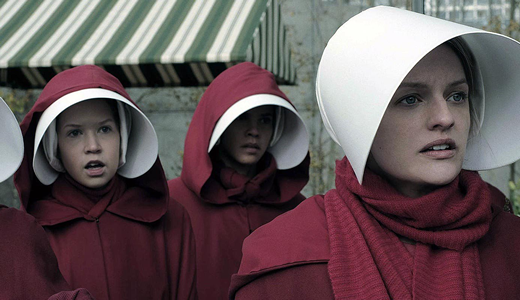Back in the day, television was considered something of a cultural unifier—the very definition of mass entertainment that would serve as a focal point for familial, communal, and even intergenerational gatherings.
Yeah, about that.
The Emmy awards—from the tone of the show to the awards themselves—illustrated a certain cultural divide. “In an age of hyper-polarization, Americans can’t even share television anymore,” wrote The Atlantic’s Derek Thompson.
The awards show, hosted by one-time-fake-conservative-pundit Stephen Colbert, was overtly political, with everyone from Atlanta creator/star Donald Glover to the legendary ladies from the 1980 movie 9 to 5 throwing shade at the current administration. The 9 to 5 reunion also proffered an unexpected joke about sex toys, as well, which was barely noticed. “And so here we are, America,” wrote Entertainment Weekly’s Darren Franich, “it’s less controversial to talk about vibrators than to talk about the President of the United States.”
Alec Baldwin won an Emmy for his outsized depiction of a certain politician on Saturday Night Live. Veep star Julia Louis-Dreyfus won her sixth consecutive Emmy for her role in a show satirizing Washington politics. And Hulu’s A Handmaid’s Tale, a dystopian fable of a women’s lack of rights in a hyper-conservative, fundamentalist future America, took home the top dramatic prize.
But The Handmaid’s Tale’s victory signaled a shift in another way, too: The Hulu show was the first Emmy Best Drama win for a program connected not to a traditional television channel, but a streaming service. In The Atlantic, Thompson suggested that Handmaid’s victory paints a dystopian future for traditional television itself. Others aren’t quite so gloomy, but it’s clear that we’re in the midst of a sea change in how we watch television. Cord cutting and the rise of streaming platforms “doesn’t signal a shift in what people want to watch. It’s how they want to watch,” eMarketer analyst Paul Verna told NBC.
The Emmys also were lauded for their particularly diverse batch of winners, from Lena Waithe’s writing award for her work on Master of None (becoming the first black woman to win an Emmy for writing) to Donald Glover’s win for comedy directing (a first, too) to Sterling K. Brown’s acting victory for his work in This is Us (another first).
The TV award show also registered record-low (or nearly so) ratings. Some believe the show’s politicization was to blame. Others aren’t so sure, and it’s probably worth noting that ratings for many an awards show have been sagging as of late. (Perhaps if Netflix hosted them, they’d see a tick up?)
Speaking of people not watching television, count actress Shailene Woodley among them. “I’m a reader,” she told E!. “So I always read a book instead of turning on my TV. … I actually haven’t had a TV since I moved out of my parents’ house at 18.” (I think she deserves special props for telling the world how little television she watches while attending, y’know, an awards show dedicated to television.)
The Emmys weren’t the only things illustrating how much the world is changing. Rolling Stone, which Salon dubs the “Bible of the boomer culture,” is up for sale. Jann Wenner, who founded the magazine and edited it for decades, is selling his share in it. “I’ve enjoyed it for a long time,” Wenner told The New York Times, but it was “just the smart thing to do.”
Does the fact that Wenner was editing a youth-oriented magazine at age 71 have something to do with the proposed sale? Can’t say. But there’s no question we’re all getting older—like, every day. Even tough-guy actor Liam Neeson announced he’s a little too old to star in action movies anymore. “I’m like, ‘Guys, I’m sixty f—ing five.’ Audiences are eventually going to go, ‘Come on.'”
And maybe we’re getting older culturally, too. A new study found, for instance, that the average new dad is older than he’s ever been. Another study reveals that today’s teens are typically three years older than they were in the 1970s when they first have sex, take their first swig of alcohol and get a job.
There’s even some discussion about whether NBC’s Will & Grace, a 1990s sitcom credited with helping normalize gay relationships, may feel too old and outdated when it returns to NBC this fall.
“… With with the legalization of gay marriage and Transparent and gay characters even popping up on the Disney Channel, the question is not whether Will & Grace is too inclusive—too ahead of the culture—but whether it is inclusive enough,” writes The New York Times’ Brooks Barnes. “At a time when Hollywood is under intense pressure to avoid stereotypes and to promote diversity from every possible angle, Will & Grace—once seen as the epitome of diversity on television—could actually find itself assailed for being behind the curve.”
We could go on and on and on this week. I haven’t even mentioned how HBO’s filming several versions of the Game of Thrones finale to foil hackers. Or how Apple wants to turn its stores into “town squares.” Or how the Navy wants to use Xbox controllers in its new periscope systems.
But really, I have other things to write. So let me leave you with Max Landis’ quest to prove that all of pop star Carly Rae Jepsen songs say, essentially, the same thing. Don’t believe him? Well, feel free to read his 150-page thesis on the subject.
If someone turns it into a screenplay, maybe it’ll win an Emmy.






Recent Comments